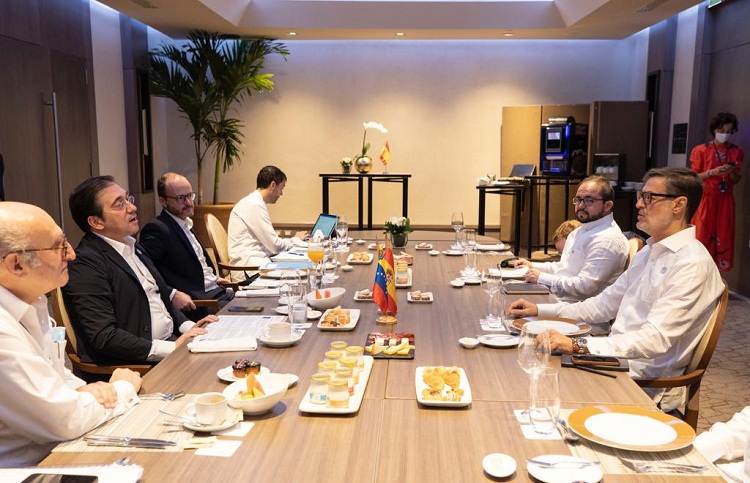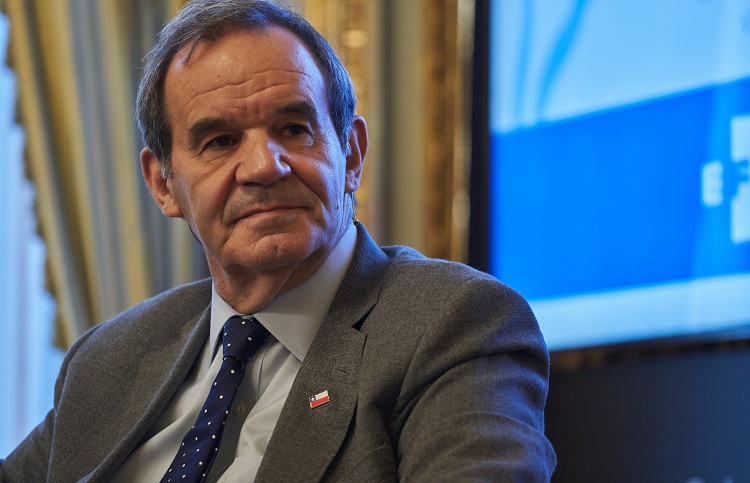The Diplomat
The Minister of Foreign Affairs, José Manuel Albares, met yesterday with his Venezuelan counterpart, Félix Plasencia, to whom he reiterated the criticisms expressed by the Spanish government of the “serious deficiencies” in the Venezuelan elections, according to diplomatic sources.
The meeting between Albares and Plasencia took place in a hotel in Santo Domingo, where both were attending the meeting of Ibero-American foreign ministers in preparation for next year’s Ibero-American Summit in the Dominican Republic.
The conversation took place hours after Nicolás Maduro’s regime said it was “disappointed” by Spain’s “value judgements” on the elections.
Both Plasencia and Albares gave an account of their meeting on Twitter, without referring to the issue of the recent elections, in which not only Spain, but also the EU observation mission, detected serious deficiencies.
The Venezuelan minister said on his Twitter account that he had held a “cordial” working breakfast with his Spanish colleague, adding, without going into detail: “It was a frank and sincere dialogue on how to strengthen our bilateral relations and deepen our multilateral cooperation”.
For his part, Albares limited himself to reporting, also on Twitter, on his meeting with Plasencia, attaching a photograph of the meeting in which the Secretary of State for Ibero-America and Spanish in the World, Juan Fernández-Trigo, who until his appointment – last July – was Chargé d’Affaires in Caracas, can also be seen.
Albares and Plasencia had already had the opportunity to meet in September in New York, in the framework of the UN General Assembly, after the Spanish minister had held a round of contacts with representatives of Nicolás Maduro’s government and opposition leaders to convey ‘Spain’s willingness to help Venezuela’ and to contribute to the ‘negotiation process’.
Last Wednesday, the Spanish Ministry of Foreign Affairs issued a statement in which, referring to the conclusions of the EU Electoral Observation Mission (EU-EOM), warned that “the regional and municipal elections held on November 21 in Venezuela have not met democratic expectations”.
Likewise, the Foreign Ministry affirmed that, although “significant improvements with respect to other elections have been identified in the development and transparency of the electoral process”, “serious deficiencies have also been perceived, such as the arbitrary disqualification of opposition candidates, the abuse of State resources, the unequal access to the media and the lack of judicial independence and respect for the rule of law”. For this reason, the Government made “an appeal to the Venezuelan authorities to put an end to these practices (…) and to quickly resume negotiations with the opposition to ensure that the next presidential elections are fully free and competitive”.
The following day, the Venezuelan Ministry of Foreign Affairs issued its own communiqué in which it expressed its “disappointment” at the “value judgments” issued by the Spanish Government. However, a few hours after this statement, Félix Plasencia held a meeting in Caracas with the Chargé d’Affaires of Spain to Venezuela, Ramón Santos, with the aim of “going over the challenges of common interest and our broad relationship in the bilateral and multilateral sphere”, as the Venezuelan minister indicated on Twitter.
Santos was appointed to the post in late October. Spain has been without an ambassador since November 2020, when the government dismissed Jesús Silva and decided to downgrade its diplomatic representation in Caracas to the level of Chargé d’Affaires with Cabinet Letters, a figure of a lower echelon, to show its dissatisfaction with the state of relations between the two countries. Ramon Santos filled the vacancy left by Juan Fernández-Trigo.
In addition to this meeting with Félix Plasencia, Minister Albares met yesterday in Santo Domingo with his counterparts from Guatemala, Pedro Brolo; Ecuador, Mauricio Montalvo; Peru, Oscar Maúrtua de Romaña; the Dominican Republic, Roberto Álvares; and Cuba, Bruno Rodríguez.
The meeting with Rodríguez, in which Albares insisted on demanding the return of press accreditations to all Efe Agency workers, came days after the Spanish minister received in Madrid the Cuban opposition leader Yunior García -one of the promoters of the frustrated Civic March and currently in Spain on a 90-day visa – to express “Spain’s commitment to freedoms”.







